Posted by admin on May 12, 2014 ·
 On 5th June Informed Scotland will take part in the inaugural Crossover Edinburgh 2014 conference at Our Dynamic Earth. The workforce learning technology summit is a fantastic opportunity to engage with business and academics face-to-face on a topic that is a priority for organisations across the landscape.
On 5th June Informed Scotland will take part in the inaugural Crossover Edinburgh 2014 conference at Our Dynamic Earth. The workforce learning technology summit is a fantastic opportunity to engage with business and academics face-to-face on a topic that is a priority for organisations across the landscape.
The conference brings together HR, learning & development and training professionals plus educationalists and academics specialising in learning technology. Speakers will tackle the issues from a range of expert perspectives in public, private and third sectors – from Tree of Knowledge, PlanB Learning, Five by Five, SCVO, CETIS, Investors in People Scotland, University of Greenwich and Sky.
Edinburgh Napier University is sponsoring the event, with exhibitors including SQA and ourselves.
An Informed Scotland Learning Technology Special is also being produced for Crossover delegates and our subscribers, highlighting the breadth of relevant learning and skills activity.
Crossover Edinburgh is the brainchild of Insight Arcade, a digital studio focused on creating innovative learning & development products. Managing Director Allan Lloyds commented: ‘We see a community of start-ups in Edinburgh driving a wave of innovation in learning and technology and we want to provide a platform for these companies.’
We’re delighted that Informed Scotland subscribers – existing and new – can buy tickets to attend at a discount rate of £95 (a £50 saving on the standard fee).
Contact [email protected] to obtain the promotional code, or for information about becoming a subscriber. Click here to register.
Follow Crossover Edinburgh 2014 on Twitter @cedsummit and #ced14
Posted by admin on May 8, 2014 ·
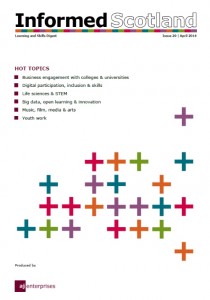
.
April saw a good spread of learning and skills activity across subjects and sectors; but there was one dominating topic: digital participation.
Major reports were published: the Scottish Government’s National Framework for Local Action; the UK Government’s Digital Inclusion Strategy and Charter; the final report of the Royal Society of Edinburgh’s spreading the benefits inquiry; and Carnegie UK Trust’s Making Digital Real case studies. Plus many innovative projects aiming to improve and make better use of digital skills, such as the Inspiring Digital Enterprise Award, IDEA and EE’s National Techy Tea Party Day.
Don’t forget to have a look at our new guest blog series featuring Informed Scotland subscribers writing on the theme Making connections across the learning & skills landscape. Many thanks to Joe Wilson of the SQA for providing the second article unravelling the mysteries of open education.
A subscriber commented: ‘This is such a useful document for my team – we have a development planning day coming up and the document provides some really useful information for the kind of partnership work we want to focus on.’
Find out how you and your team could benefit. Become an Informed Scotland subscriber to keep on top of all the developments. Email [email protected] to request a sample copy.
Posted by admin on May 6, 2014 ·
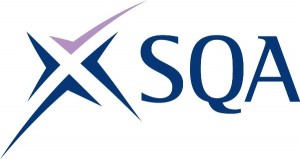 by Joe Wilson, Head of New Ventures at the Scottish Qualifications Authority (SQA). This is the second guest blog in our series featuring Informed Scotland subscribers writing on the theme Making connections across the learning & skills landscape.
by Joe Wilson, Head of New Ventures at the Scottish Qualifications Authority (SQA). This is the second guest blog in our series featuring Informed Scotland subscribers writing on the theme Making connections across the learning & skills landscape.
There is a dramatic change happening in learning, assessment and certification around the world. In some countries this is being driven by the high cost of formal learning, in others by beliefs in greater access and equity and anchored by an understanding of education as a social good.
Loosely, many of these developments can be grouped under the banner of open education.
Open learning opportunities have been available since the advent of the internet; in the UK with Open University programmes on TV and radio you could argue before the internet. But Khan Academy and ALISON began structuring learning into recognisable, outcome based chunks for people who want to learn maths or workplace based skills respectively about six years ago, and they make the whole programme free.
In more unstructured ways, YouTube, SlideShare and other social platforms increasingly contain learner ready learning materials, while iTunes U has built up an amazing collection of lessons from institutions around the world that learners can dip into.
These materials are available to be included in both informal and formal learning.
The new wave of ‘open’ takes things on further. In some countries these developments manifest themselves as open textbook initiatives: teachers getting together, their efforts funded by charitable endowments, to create freely available textbooks meaning that learners no longer have to pay the high prices for standard academic textbooks. This to support learners studying with an institution.
Massive Open Online Courses (MOOCs) have been the headline grabbers for open education – though it can be argued, at least in terms of their content, that they are not really that open. Have a look at the offerings from Coursera, MITx and the edX platform and from the UK’s own FutureLearn. Suddenly it is possible to access chunks of university courses free from anywhere in the world. The numbers engaging with some of these programmes run into hundreds of thousands from all around the world. These developments are part funded by charitable endowments and host institutions, and in some cases by venture capitalists intent on disrupting traditional programme delivery.
At the heart of a lot of this is simply a move to open up learning materials to a wider audience and to encourage a sharing culture among institutions and teachers. This has been driven by UNESCO since 2002 and the UNESCO Open Learning Declaration.
The Declaration encourages countries to change their practices around publically created Open Educational Resources (OERs). This includes any type of educational materials in the public domain or introduced with an open license. The nature of these open materials means that anyone can legally and freely copy, use, adapt and re-share them. OERs range from textbooks to curricula, syllabi, lecture notes, assignments, tests, projects, audio, video and animation.
In Wales the university system has already signed up to a Wales Open Education Declaration which will mean, as with publically funded research, universities will share publically funded learning materials. There are a number of countries around the world making similar commitments to open up learning materials from their schools, further (FE) and higher education (HE) sectors with appropriate licensing, normally creative commons, which will allow a global sharing culture to develop.
In the UK many of the platforms needed for a more open system are in place already. Jorum provides UK HE and FE institutions with an open sharing platform for learning content, and in Scotland, College Development Network’s Re:Source is the open sharing platform for college learning materials. SQA has committed to moving any learning materials we have out from the secure area which was accessible only to SQA centres and onto Re:Source with an appropriate creative commons license.
There are also grassroots organisations showcasing open initiatives in Scotland, encouraging institutions to think about moving towards a national open policy along the lines of the UNESCO declaration. The Open Scotland initiative picks up a range of open practice.
On another front, Mozilla has developed Open Badges. It is free software and an open technical standard that allows any organisation to create, issue and verify digital badges – so in effect a new way of credentialing learning.
Greater openness can only be good for formal and informal learners. While some may see open educational resources as being part of the education sector’s fetish with content, or open badges as a challenge to more formal forms of certification, in fact both are complementary to lifelong learning.
The SQA is continually looking at ways to embed the best of open educational practice in Scottish education for the benefit of our learners.
For further information contact Joe Wilson at the SQA on [email protected]
Also read our first guest blog: UKCES makes connections between disparate ideas
Posted by admin on April 28, 2014 ·

Informing SMEs & family businesses
We were delighted to support Sustainability: The challenge facing Scotland’s SMEs & family businesses, a seminar in Edinburgh on Friday 25 April organised by the Goodison Group in Scotland (GGiS) and Scotland’s Futures Forum (SFF). Each of the 70 delegates took away a copy of Informed Scotland, giving them information about the wealth of learning and skills activity taking place right across the landscape which can be used to enlighten and develop businesses and their employees.
According to conference papers, 99.3% of all private sector enterprises in Scotland are SMEs and 63% of these are family businesses. New business birth rate is extremely healthy, but sustainability and growth ‘could be much better’.
Donald Jarvie of SFF commented that SMEs ‘can better utilise education’ for sustainability. It’s a win-win situation: learning and skills development is crucial for business survival and vital if society is to retain the knowledge and expertise each business contains.
Graham Smith of the University of Strathclyde explained that an underestimated social cost of business failure is the often ‘completely wasted’ knowledge and know-how it has accumulated. Strathclyde is involved in a European Transfer of Knowledge-Transfer of Human Capital project, tackling the EU-wide SME issue of business transferability.
The unique challenges and rewards of running a family business were vividly brought to life by Creative Training Unlimited actors, followed by a rousing plea from Martin Stepek, Scottish Family Business Association, for a concerted campaign to highlight their role and needs. He wants to see ‘every university in Scotland providing education for family business’.
Universities already involved include:
A Success through Succession project was run by Glasgow Caledonian University, and in other parts of the UK, Lancaster University runs The Centre for Family Business, and Regent’s University, London offers a Family Business pathway in its Global Management MA, recognised by the Chartered Management Institute. However, as GGiS/SFF suggest, ‘we appear to be lagging behind America and parts of Europe’ where much more learning support is available.
The seminar is to be repeated on 9 May at University of the Highlands & Islands in Inverness.
Delegates who picked up a hard copy of Informed Scotland at the event can email [email protected] to request a pdf version with links enabled.
Posted by admin on April 4, 2014 ·
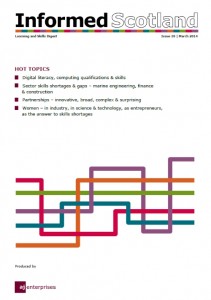
.
March was a very busy month, with many positive stories to report. The hottest topic was probably all things digital – skills investment plan from Skills Development Scotland, a new Digital Interaction Centre at Robert Gordon University, innovation funding, and Raspberry Pis from Skyscanner and Young Scot. There were new digital frameworks and guides, and computing qualifications and MOOCs being taken more seriously by a wider range of organisations.
The language of business start-ups is also worth highlighting, as it’s becoming one to savour! Look out for incubators, hatcheries, accelerators – not to mention chiclets and coworking…
Don’t forget to have a look at our new guest blog series featuring Informed Scotland subscribers writing on the theme Making connections across the learning & skills landscape. Many thanks to the UK Commission for Employment & Skills for providing the first article on their Employer Skills Survey.
Last month @engsimshow tweeted: @InformedScot provides quality analysis of the learning and skills agenda in Scotland and beyond, an informative and intelligent briefing
And @tonyfinnA said: Thanks @InformedScot for a very useful, monthly summary of what is happening across Scotland
Become an Informed Scotland subscriber to keep on top of all the developments. Email [email protected] to request a sample copy.
Posted by admin on March 27, 2014 ·
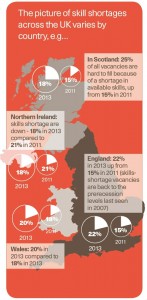
UKCES Employer Skills Survey infographic
UK Commission for Employment & Skills (UKCES) kicks off our new guest blog series, featuring Informed Scotland subscribers writing on the theme Making connections across the learning & skills landscape.
Creativity is making connections between disparate ideas. David Ogilvy, advertising magnate, built into his creative process time in which he ignored problems entirely, allowing his subconscious to churn over links and possible solutions. Five decades later, Steve Jobs agreed entirely, saying that “Creativity is just connecting things”. The first step for Ogilvy, and presumably Jobs as well, was to take in enough information – dots that could be drawn between with new insights.
So if your ideas are a product of the data you have – or in terms of your information diet, you are what you read – best then to ensure you refer to the highest quality sources available. How to judge quality? At the butcher, you might look at the cut, the marbling of fat, the colour of the meat. In the statistical world, you would be interested in the sample size, selection effects, and the quality of analysis.
This leads us to the UK Commission’s Employer Skills Survey (ESS), prime rib in a world of ground beef patty research. The survey takes a sample of over 91,000 establishments across the UK. That sample size is huge, allowing detailed interrogation of sectors and industries. The type, size, and location of interviews are carefully controlled to allow conclusions to be drawn about the overall business community. And the analysis is carried out by the government’s skills experts at UKCES.
The best part about the latest skills survey is that so much of the information from it is openly published, in open formats, ready to be combined and compared with other sources. While the insights from detailed reports are available, the underlying data tables can also be downloaded and examined in detail. We have also released the data in LMI for All, which brings together a range of different sources of labour market information in an online data portal.
So what else has the ESS data been combined with in practice?
The Financial Times combined it with information from the Higher Education Statistics Authority and the Office for National Statistics (ONS) to write and illustrate an article on skills shortages in engineering.
University Technical Colleges combined it with course information and advice from industry to identify areas of skills shortages and tailor the training programmes they offer.
Web developers Neon Tribe used it through LMI for All to create Careertrax, a careers guidance app.
There is so much data on tap that releases are happening in stages. The UK data was released at the end of January. Tailored data for local authorities and local enterprise partnerships in England came out in February, followed by Wales and Northern Ireland in June. Data, stats and graphics for Scotland will be launched in Glasgow on 7 July.
If you’re feeling intellectually undernourished, have a look at your data diet – ESS could be just what you need.
If the idea of a rich data source filling out your data diet appeals to you, consider the ways in which ESS could help.
For further information from UKCES contact: [email protected]. A link to the Scotland data release can be found here.
Posted by admin on March 24, 2014 ·
 Later this week we’ll publish the first of our new guest blogs, featuring Informed Scotland subscribers. We’re delighted to announce that the UK Commission for Employment & Skills (UKCES) will be launching the series. Organisations and individuals will be writing from their different perspectives on the theme Making connections across the learning & skills landscape.
Later this week we’ll publish the first of our new guest blogs, featuring Informed Scotland subscribers. We’re delighted to announce that the UK Commission for Employment & Skills (UKCES) will be launching the series. Organisations and individuals will be writing from their different perspectives on the theme Making connections across the learning & skills landscape.
Informed Scotland makes connections across learning and skills in business, education, government and wider society, and seeks to identify emerging patterns and themes. As well as keeping busy people up to date with what’s happening, it aims to highlight opportunities for cross-sectoral learning and collaboration.
This is our opportunity to share subscribers’ stories about innovative, successful connections – such as those between education and business, school and university, arts and science, public and private training bodies, adult and young learners… You might read about the benefits of collaborating and learning from others; ideas generated in one sector, picked up and developed to suit another; future opportunities and projects; or the hurdles overcome to achieve success. But as it’s a guest blog, we’re as in the dark – and as excited – as you to see what’s coming!
Check back later this week to read the excellent article from UKCES – connecting dots with new insights.
Posted by admin on March 13, 2014 ·

Image is © Andrew Mackie
Almost every day we add new learning and skills related conferences, seminars, workshops and exhibitions to our Calendar of events. Most are targeted at specific business or education sectors and professions, however plenty are open to broader groups and some to the wider public – and many are free to attend.
At the time of writing almost 60 events are listed for the rest of March alone. All the events, apart from Radio EDUtalk live broadcasts, are face-to-face. We decided not to attempt to keep track of webinars and other online events… that would be a full-time task!
There are currently events listed through to October taking place in every city and right across Scotland, including Lerwick, Kilmarnock, St Andrews, Cumbernauld and Dalkeith.
Topics are wide-ranging, from music to MOOCs, benchmarking to leadership, technology to sport, finance to food. Each entry includes the organiser, location, a link for more detail and cost where available. More detailed information is included about events run by Informed Scotland subscribers, and those at which they are presenting. Just one of the extra benefits of signing up to our monthly digest – find out more here.
Use the Calendar to find an event to attend, or to find out the dates to avoid for the one you’re organising! There’s no charge for listing. We look out for events to add, or you can email or tweet us the detail so we don’t miss any. And watch out for our ‘Follow Friday’ #ff tweets for the following week’s organisers.
People are finding it a useful service. Here are some recent favourite tweets:
@CASScotland ‘Thank you very much for adding us to the calendar and giving us a bit extra publicity #casscot13 #scpd’
@DofEScotland ‘Thanks so much! #youreawesome!’
@musicalfutures Thank you so much, really appreciate the help – we want to reach loads of music teachers in Scotland!
@DyslexiaScotlan @MacRoberts Thanks, we will keep you posted of any future events. #dyslexia #workplace
And you might like to know of some other related events compilations:
Labour Market Intelligence events from Skills Development Scotland; Meta Scotland, a compendium of calendars for tech & creative startups ; Employability in Scotland events from the Scottish Government.
Do you have an event you’d like included? Send the details to [email protected] or tweet @InformedScot
Posted by admin on March 7, 2014 ·
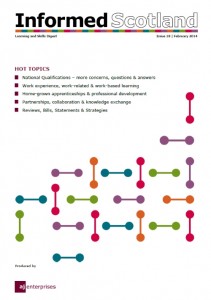
.
February was a short month, though there was no shortage of learning and skills items to include.
Look out for the Draft Statement of Ambition for adult learning; it’s been a bit of a Cinderella sector for a while and demands some attention! And there are more changes at the top, with another head of education announcing her retirement – there appear to be seven senior local authority education department vacancies currently being advertised alone…
Favourite items this month include the Scottish Media Academy/Archerfield pilot media training course for senior executives in business, education and government, which Angela was delighted to participate in. And the home-grown – possibly unique? – Professional Learning Programme for teachers at Preston Lodge High School, East Lothian.
Word of the issue? ‘Big’ – from big data to Big Music! The University of Glasgow received Arts & Humanities Research Council funding for three ‘big data’ projects (quick explanation of the term is included for the uninitiated!), and The Big Music Project was launched, with Youth Scotland playing a key role (no pun intended…).
Last month @keithboards, who receives copies via City of Edinburgh Council’s subscription, tweeted: Enjoying @InformedScot learning and skills digest. Crammed full of great info!
Become an Informed Scotland subscriber to keep on top of all the developments. Find out how to get your copy.
Posted by admin on February 7, 2014 ·
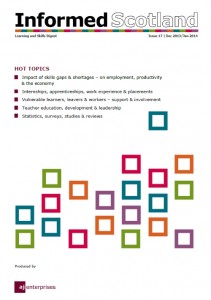
.
December was predictably quiet – then January exploded with activity across the learning & skills landscape! It’s been quite a task to make sure all of the items were squeezed in to this double issue.
There are some meaty reports to get your teeth into, including the UKCES Employer Skills Survey, the OECD’s PISA results, and the latest school, university and college statistics from UCAS, Skills Development Scotland and others. Plus some very interesting reports on digital participation and the ‘realtime generation’ from the RSE and Logicalis UK.
Eddie Broadley, Senior Education Officer for Education Scotland commented: ‘This is such a useful document, well produced and structured.‘
Become an Informed Scotland subscriber to keep on top of all the developments. Find out how to get your copy.
 On 5th June Informed Scotland will take part in the inaugural Crossover Edinburgh 2014 conference at Our Dynamic Earth. The workforce learning technology summit is a fantastic opportunity to engage with business and academics face-to-face on a topic that is a priority for organisations across the landscape.
On 5th June Informed Scotland will take part in the inaugural Crossover Edinburgh 2014 conference at Our Dynamic Earth. The workforce learning technology summit is a fantastic opportunity to engage with business and academics face-to-face on a topic that is a priority for organisations across the landscape.







